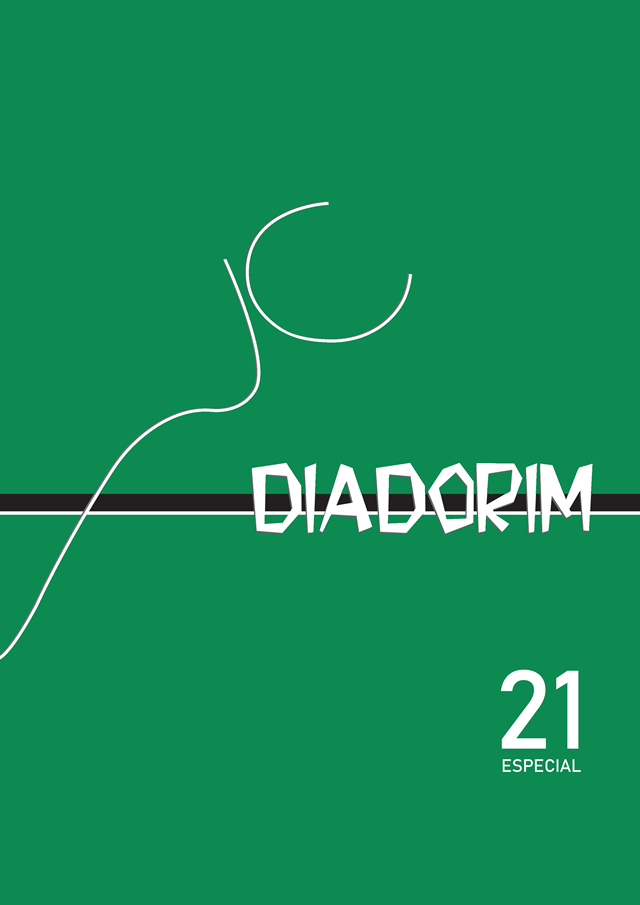Anchieta's writing – Sacred and profane in portuguese America
DOI:
https://doi.org/10.35520/diadorim.2019.v21nEspa28421Keywords:
Anchieta, Literature, Sacred, Profane, Portuguese America.Abstract
During the second half of the 16th century, the newly proclaimed saint of the Catholic Church resorted to the appropriation of the indigenous “pagan” vocabulary in order to convey the Catholic faith to native Brazilians and, taking advantage of the notions of sacred and profane in a rather literary construction, raised them from the condition of savages to sons of God, thus resembling the “white man”. The methodology used here is the reading and analysis of Anchieta's theatrical work supported by historical, political and religious contextualization. As a result, it is argued that his plays had a humanizing character through which it was possible to provoke an awakening of consciousness (at least religious) in his audience. Based on the analyse is of his theatrical literary production and aiming to have an honest look at its production, this article seeks to show that more than just a counter-reformist anticipation or form of cultural aggression, its literature is in some respects humanizing (in the reading of the time) and, by Ignatian molds, giver of meaning.
References
ALVIM, D. M.; COSTA, R. Anchieta e as metamorfoses do imaginário medieval na América portuguesa. Revista Ágora, n. 1, p. 1-19, 2005. Disponível em: <http://periodicos.ufes.br/agora/article/view/1878/1390>. Acesso em: 04 de março de 2016.
ANCHIETA, J. Teatro de Anchieta - Obras Completas. Introdução e notas pelo padre Armando Cardoso. 3º Vol. São Paulo: Loyola, 1977.
ANCHIETA, J. Lírica portuguesa e tupi. Originais em português e tupi acompanhado de tradução versificada, introdução e anotações ao texto pelo padre Armando Cardoso. São Paulo: Loyola, 1984.
ANCHIETA, J. O Auto de São Lourenço. Introdução, tradução e adaptação de Walmir Ayala. Rio de Janeiro: Ediouro, 1997.
AZEVEDO FILHO, L. A. A Poética de Anchieta. Rio de Janeiro: Gráfica Carioca, 1962.
. Anchieta, a Idade Média e o Barroco. Rio de Janeiro: Gernasa, 1966.
BOSI, A. Dialética da Colonização. 3ª ed. São Paulo: Companhia das Letras, 1992.
BOSI, A. História Concisa da Literatura Brasileira. 41ª Ed. São Paulo: Cultrix, 2003.
BOXER, C. R. Igreja e a expansão ibérica: 1440-1770. Lisboa: Edições 70, 1981.
CANDIDO, A. Iniciação à literatura brasileira: resumo para principiantes. 3. ed. São Paulo: Humanitas/ FFLCH/USP, 1999.
CARDIM, F. Tratados da terra e gente do Brasil. Rio de Janeiro: J. Leite & Cia, 1925.
ELIADE, M. O sagrado e o profano: a essência das religiões. 3. ed. São Paulo: WMF Martins Fontes, 2010.
GALIMBERTI, U. Rastros do Sagrado. São Paulo: Paulus, 2003.
LEITE, S. História da Companhia de Jesus no Brasil. Lisboa: Portugália; Rio de Janeiro: Instituto Nacional do Livro, 1938-1950. 10 v.
LEITE, S. Novas Cartas Jesuíticas (de Nóbrega a Vieira). São Paulo: Companhia Editora Nacional, 1940.
NAVARRO, E. A. Teatro – José de Anchieta. São Paulo: Martins Fontes, 1999.
PONTES, J. Teatro de Anchieta. Rio de Janeiro: MEC/Serviço Nacional de Teatro, 1978.
Downloads
Published
Issue
Section
License
Copyright transfer -- Authorization to publication
If the submitted article is approved for publication, it is already agreed that the author authorizes UFRJ to reproduce it and publish it in Diadorim: revista de estudos linguísticos e literários, the terms "reproduction" and "publication" being understood as defined respectively by items VI and I of article 5 of Law 9610/98. The article can be accessed both by the World Wide Web (WWW) and by the printed version, with free consultation and reproduction of a copy of the article for the own use of those who consult. This authorization of publication is not limited in time, and UFRJ is responsible for maintaining the identification of the author of the article.

The journal Diadorim: revista de estudos linguísticos e literários is licensed under a Creative Commons Attribuition-NonCommercial 4.0 International (CC BY-NC 4.0).

